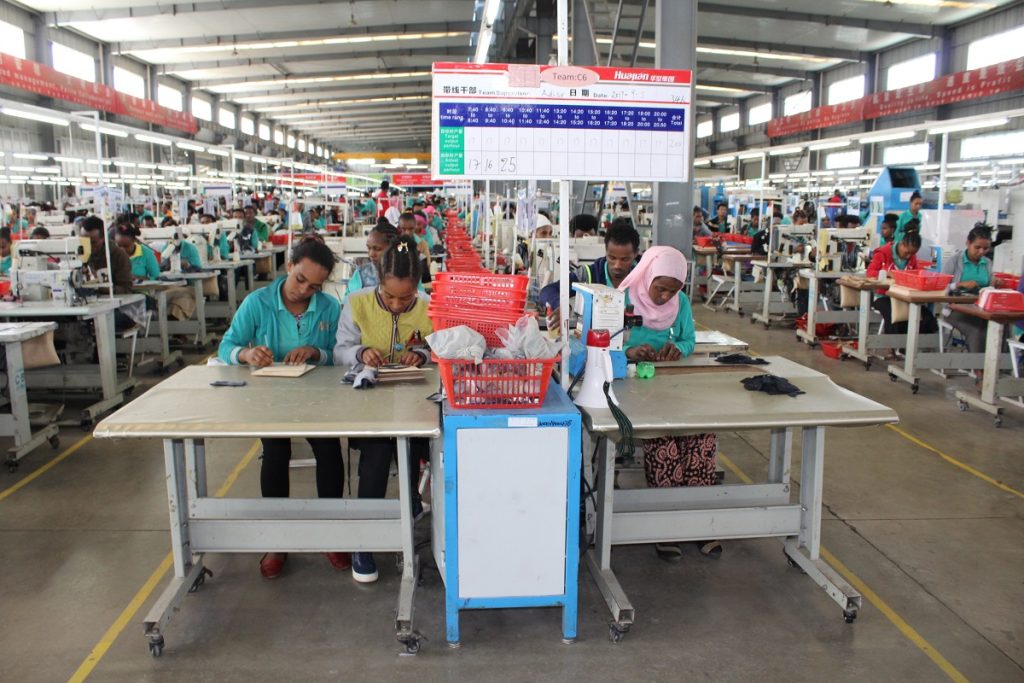By Sharon Tshipa
Addis Ababa, Sept. 7 (BSHD) – African journalists have decried wages paid to African employees by their Chinese employers. The outcry followed a briefing by the Eastern Industrial Zone, One Stop Service Manager, Mulugeta Tiruneh who revealed that industrial workers in Ethiopia were paid less than USD3 per day.
In his presentation, Tiruneh said that uneducated employees of the Huajian Group, Eastern Industrial Zone were paid less than USD3 for a day’s worth of work, while fresh tertiary graduates were paid between USD110 and USD200 per month.
Some of the journalists participating in the three day Media Workshop on Reporting Africa-China Engagements which was hosted by Oxfam International’s Africa-China Dialogue Platform (ACDP), in collaboration with the Wits Africa-China Reporting Project, lamented the low payments and ill treatment some Chinese employers give to their African employees. Asserting that it was apparent that Chinese investors were taking advantage of their African counterparts, and hence were reaping more from the economic relations.
Explaining the scanty wages Tiruneh said “the cost of living in Ethiopia is low.” However journalists were not satisfied with the justification thereof.
“Affording Chinese investors cheap labour in Africa should be taken as a strategic way to attract foreign direct investments. Once the investors are here, once they are settled, African governments can revise minimum wages. There would be no point in deterring investors from the onset with stipulations of high salaries,” advised Gedion Jalata, Program Manager, Africa-China Dialogue Platform, Oxfam International.
Given the fact that often times Chinese investors employ Africans without the necessary skills, and are subsequently compelled to train them, Jalata was quick to emphasise and highlight the rationale behind cheap labour to journalists from fifteen different countries that had graced the workshop. Prior to this discussion, Sherry of the Huajian Group, Eastern Industrial Zone had affirmed that they often send their Ethiopian employees to China for training, and at times train other employees on the job in Ethiopia.
All things said, a question still remained. Why go through such lengths as Africans to attract Chinese foreign direct investments. The answer lies in the fact that China is a country and Africa is a continent, but China’s GDP surpasses that of Africa thrice.
“China has lifted 700 million people out of poverty…,” Gedion Jalata reminded. Citing China as a country that needs to be emulated. A country that Africa, as a continent whose population is slightly exceeded by that of China, can learn from and lean on for speedy sustainable development across all sectors.
But what qualified China as a priority development partner of African governments one may ask?
According to the research report launched by Oxfam International on September 5, 2017, a report titled “New Actors, New Models, New Outcomes? African Countries’ engagement with China and other Development Partners in Achieving the SDGs and Agenda 2063, the phenomenal rise of emerging powers and the global financial crisis of 2008 gave greater prominence to the role of China and other non-traditional partners.
The report further outlines that China’s engagement in African development is manifested through its burgeoning economic interests in the resource sector and to a lesser extent the African market, framed under the rubric of South–South Development Cooperation. It quotes that the China–Africa two way trade leapt from just over $10bn in 2000 to $215bn, while Chinese FDI stock grew from $500m to $32bn between 2003 and 2014. It further reminds that the specifics of Chinese engagement with African development are played out through the multilateral Forum on China-Africa Cooperation (FOCAC) and directly through bilateral relations.
Nevertheless, the report informed Africans that they own the development process. “Africans own this global process to an unprecedented degree, both in terms of their involvement in developing it and in terms of the revived material conditions on the continent. Part and parcel of the enhanced African economic performance is the intertwining of African relations with that of more established emerging countries like China,” it read.
The report called on African governments to make sure that efforts are conducted and sustained over time to integrate the provisions of SDGs and Agenda 2063 more thoroughly into National Development Planning, to foster the conditions for domestic resource mobilization through support for revenue generation and to reflect commitments to promote women and gender equality and make more effort to include SDG 5 in development assistance provisions of FOCAC VI.
On the other hand it advised the African Union to consider leading a process towards developing a “common African Position on Implementation of Agenda 2063 and the SDGs.” Making sure that efforts are conducted and sustained over time to integrate the provisions of SDGs and Agenda 2063 more thoroughly into National Development Planning. Concurrently, the Common African Position on Implementation is said could also promote the use of programmatic evaluations of project impact as a qualitative measure of achievement in FOCAC-based projects. It notes that this would help facilitate better outcomes and more efficient use of development assistance. It also encouraged the AU to Encourage China and other development partners to engage in trilateral cooperation to work with China and African governments on development assistance to leverage knowledge and pool resources in pursuit of SDGs and Agenda 2030.
In endorsing the sentiments highlighted, Mr. Chen Xufeng Charge d’Affaires of the Chinese Mission to the AU when speaking at the opening of the Media Workshop said, “China is firmly committed to promoting the cooperation with the continent through common, intensive, green, secure and open development, and supporting Africa’s efforts to address the main bottlenecks; namely lack of quality infrastructure, professional and skilled personnel and financial resources. China is ready to help Africa resolve three fundamental issues of employment, food and health by developing a self-sustainable system of industrialization, food security, and disease prevention and control system.”





